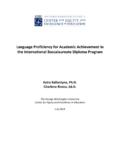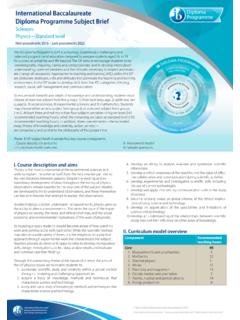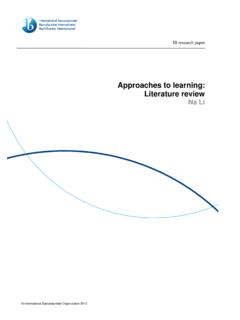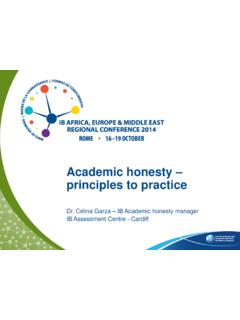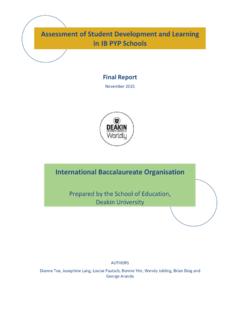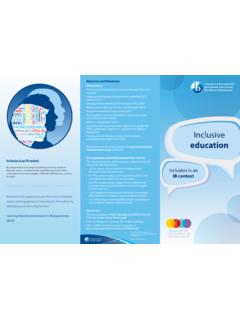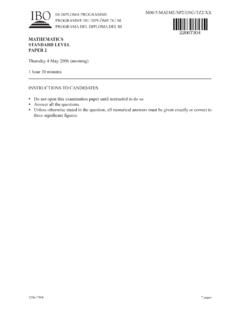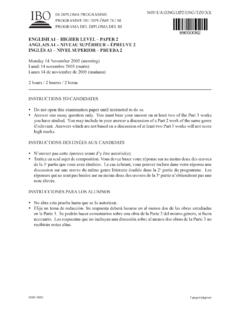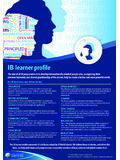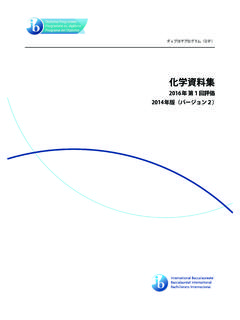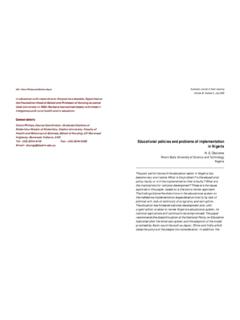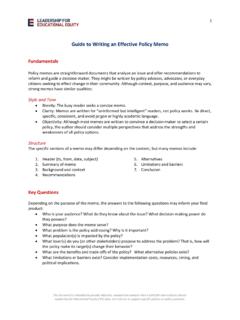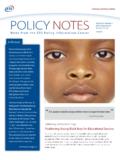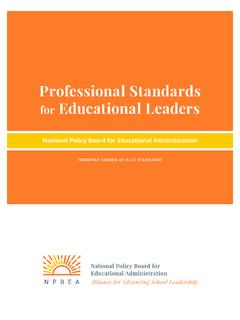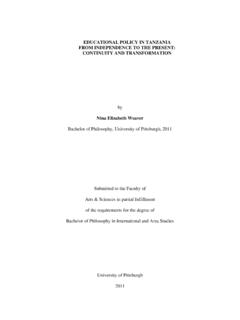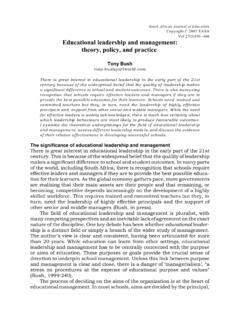Transcription of Academic honesty in the IB educational context
1 Academic honesty in the IB educational contextAcademic honesty in the IB educational contextPublished August 2014 Published on behalf of the International Baccalaureate Organization, a not-for-profit educational foundation of 15 Route des Morillons, 1218 Le Grand-Saconnex, Geneva, Switzerland by theInternational Baccalaureate Organization (UK) LtdPeterson House, Malthouse Avenue, Cardiff GateCardiff, Wales CF23 8 GLUnited KingdomPhone: +44 29 2054 7777 Fax: +44 29 2054 7778 Website: International Baccalaureate Organization 2014 The International Baccalaureate Organization (known as the IB) offers four high-quality and challenging educational programmes for a worldwide community of schools, aiming to create a better, more peaceful world. This publication is one of a range of materials produced to support these IB may use a variety of sources in its work and checks information to verify accuracy and authenticity, particularly when using community-based knowledge sources such as Wikipedia.
2 The IB respects the principles of intellectual property and makes strenuous efforts to identify and obtain permission before publication from rights holders of all copyright material used. The IB is grateful for permissions received for material used in this publication and will be pleased to correct any errors or omissions at the earliest rights reserved. No part of this publication may be reproduced, stored in a retrieval system, or transmitted, in any form or by any means, without the prior written permission of the IB, or as expressly permitted by law or by the IB s own rules and policy . See merchandise and publications can be purchased through the IB store at General ordering queries should be directed to the Sales and Marketing Department in : +44 29 2054 7746 Fax: +44 29 2054 7779 Email: IB programme continuum of international educationAcademic honesty in the IB educational contextInternational Baccalaureate, Baccalaur at International and Bachillerato Internacional are registered trademarks of the International Baccalaureate mission statementThe International Baccalaureate aims to develop inquiring, knowledgeable and caring young people who help to create a better and more peaceful world through intercultural understanding and this end the organization works with schools, governments and international organizations to develop challenging programmes of international education and rigorous programmes encourage students across the world to become active, compassionate and lifelong learners who understand that other people, with their differences, can also be right.
3 IB learner profileThe aim of all IB programmes is to develop internationally minded people who, recognizing their common humanity and shared guardianship of the planet, help to create a better and more peaceful world. IB learners strive to be:InquirersThey develop their natural curiosity. They acquire the skills necessary to conduct inquiry and research and show independence in learning. They actively enjoy learning and this love of learning will be sustained throughout their explore concepts, ideas and issues that have local and global significance. In so doing, they acquire in-depth knowledge and develop understanding across a broad and balanced range of exercise initiative in applying thinking skills critically and creatively to recognize and approach complex problems, and make reasoned, ethical understand and express ideas and information confidently and creatively in more than one language and in a variety of modes of communication.
4 They work effectively and willingly in collaboration with act with integrity and honesty , with a strong sense of fairness, justice and respect for the dignity of the individual, groups and communities. They take responsibility for their own actions and the consequences that accompany understand and appreciate their own cultures and personal histories, and are open to the perspectives, values and traditions of other individuals and communities. They are accustomed to seeking and evaluating a range of points of view, and are willing to grow from the show empathy, compassion and respect towards the needs and feelings of others. They have a personal commitment to service, and act to make a positive difference to the lives of others and to the approach unfamiliar situations and uncertainty with courage and forethought, and have the independence of spirit to explore new roles, ideas and strategies.
5 They are brave and articulate in defending their understand the importance of intellectual, physical and emotional balance to achieve personal well-being for themselves and others. ReflectiveThey give thoughtful consideration to their own learning and experience. They are able to assess and understand their strengths and limitations in order to support their learning and personal honesty in the IB educational contextContentsIntroduction 1 Purpose of this document 1 Academic honesty in the IB 2 Making Academic honesty a school priority: Developing, implementing and reviewing an Academic honesty policy 4 Academic honesty in the IB educational context 7A framework for identifying aspects of Academic honesty across the continuum of IB programmes 7 Academic honesty Primary Years Programme 8 Academic honesty Middle Years Programme 12 Academic honesty Diploma Programme 16 Academic honesty IB Career-related Certificate 20 Conclusion 24 Appendix 25 Bibliography 25 Academic honesty in the IB educational context11 Purpose of this documentIntroductionIntroductionInternat ional Baccalaureate (IB) programmes encourage students to inquire and to think critically and creatively.
6 Students are then asked to give shape to their thinking through oral discussion or presentations, through visual representations and displays, and in multiple forms of writing. However, we live in an age in which we are all flooded by information and opinions. How can we help students navigate these waters so that they are able to confidently talk or write about what they are learning, making visible and explicit how they have constructed their ideas and what views they have followed or rejected? This is essentially what Academic honesty is: making knowledge, understanding and thinking transparency needs to be taught and supported throughout a child s education. In order to fully master the technical aspects of Academic honesty , such as accurately citing and referencing, students need to understand how knowledge is constructed and, consequently, their own role in furthering knowledge construction and building understanding.
7 The technical skills are essential but the understanding of the concepts and values behind them comes safe and encouraging learning environment in which students can explore ideas and make visible the development of their own thinking will support academically honest behaviours and help to instill the values and principles that lie behind such behaviours. The attributes of the learner profile are important in nurturing such an environment. This guide will support schools, teachers and parents in providing such a learning environment and in helping students of all ages be academically honest in all their of this documentThe purpose of this publication is to support IB World Schools in developing an Academic honesty ethos; it offers guidance in designing a strategy that combines the school s internal policy with good Academic practice. The principle of Academic honesty should be viewed positively by the entire school community and become a natural part of Academic study, remaining with the IB student throughout his or her education and honesty in the IB educational context22 IntroductionAcademic honesty in the IBAcademic honesty is an essential aspect of teaching and learning in IB programmes where action is based on inquiry and 1 Inquiry, action and reflection in teaching and learningApproaches to learningThrough approaches to learning (ATL) in IB programmes, students develop skills that have relevance across the curriculum and help them learn how to learn.
8 The ATL skills are as follows. Self-management Social Communication Thinking ResearchApproaches to teaching are equally important in developing learning abilities. These are as follows. Inquiry-based Conceptually driven Contextualized Collaborative Differentiated Informed by assessmentAcademic honesty in the IBAcademic honesty in the IB educational context3 Understanding Academic honesty is part of this learning and teaching. It has become increasingly important as access to information through technological innovation has increased, and ideas about learning and how knowledge is constructed have changed. Figure 2 gives a summary of the was: canonical and beyond critical evaluation of all except ordained experts authoritarian disciplinaryKnowledge is: not absolute constructed democratic interdisciplinaryEducated = knowledge of canonsEducated = ability to inquire/researchKnowledge easily transmitted with lectures, readings and required rote learningInquiry/research cycle driven by questioningAccurate reproduction and correct answers testedEvidence of understanding from research evaluated against criteriaKnowledge acquisition equated with IQ/intelligence to some extentIQ questionedInquiry and asking questions valuedMetaphors for learning included blank slate , banking, filling upMetaphors to construct, weaveLearning/education completedLifelong learningBehaviours required from students were passive and controlled by external authorityStudents expected to be active, constructive, independent, but collaborative, learnersPart of a bigger modernism paradigm with beliefs in scientism.
9 Newtonian physics, linear thought, clockwork universe, cause and paradigmDeconstruction of grand narrativesCritical literacy importantFigure 2 Comparative chart of recent changes in learningAcademic honesty is part of being principled , a learner profile attribute where learners strive to act with integrity and honesty as we question, inquire and act (IB learner profile in review: Report and recommendation (April 2013), page 21). Academic honesty in the IB educational context44 IntroductionMaking Academic honesty a school priority: Developing, implementing and reviewing an Academic honesty policyAcademic honesty is embedded in the Programme standards and practices (2014).Standard C3 in all four programmes states:4. Teaching and learning promotes the understanding and practice of Academic B1 for the Middle Years Programme (MYP), Diploma Programme (DP) and IB Career-related Certificate (IBCC) schools includes the following The school develops and implements policies and procedures that support the programme(s).
10 The school has developed and implements an Academic honesty policy that is consistent with IB does the IB require IB World Schools to have a written Academic honesty policy ?An Academic honesty policy ensures that a school s procedures for this practice are transparent, fair and consistent. It describes the rights and responsibilities of all members of the school community so that everyone understands what constitutes good practice, and misconduct, and what actions are to be taken if there are transgressions. The policy should be dynamic and ensure that students are taught good practice in all aspects of their and reviewing a policy on Academic honestyAuditAn Academic honesty audit is the first stage in devising or revising an Academic honesty policy . The school s philosophy should be made clear and should, of course, be aligned with the IB position.
